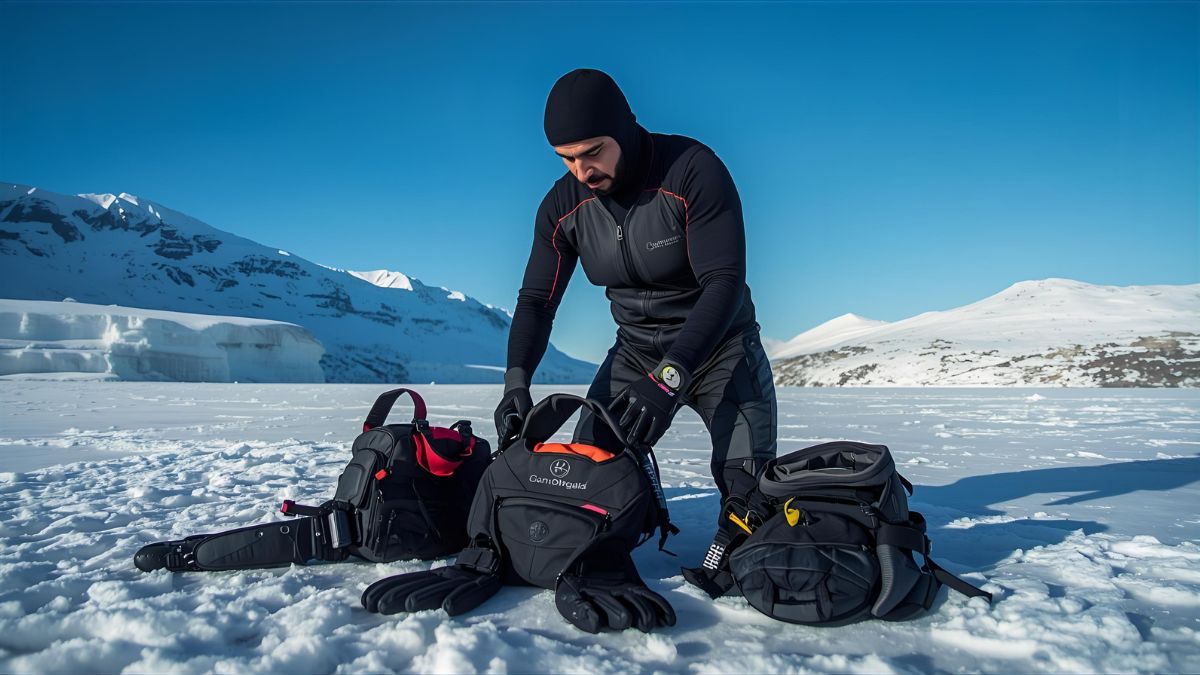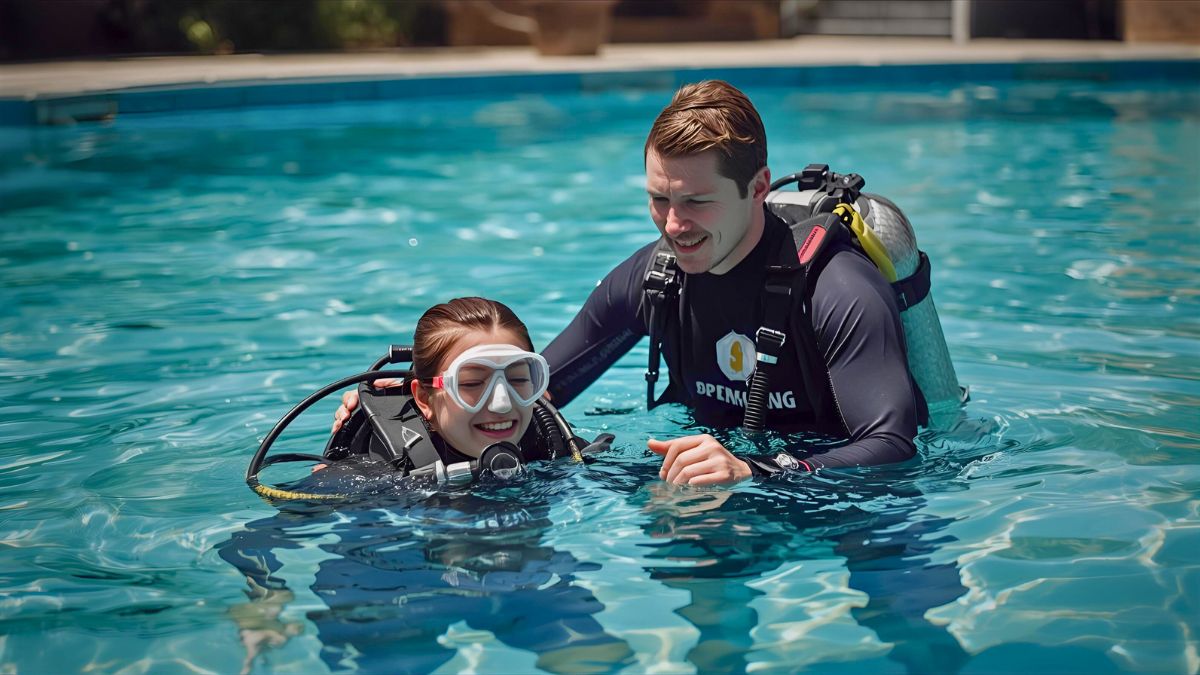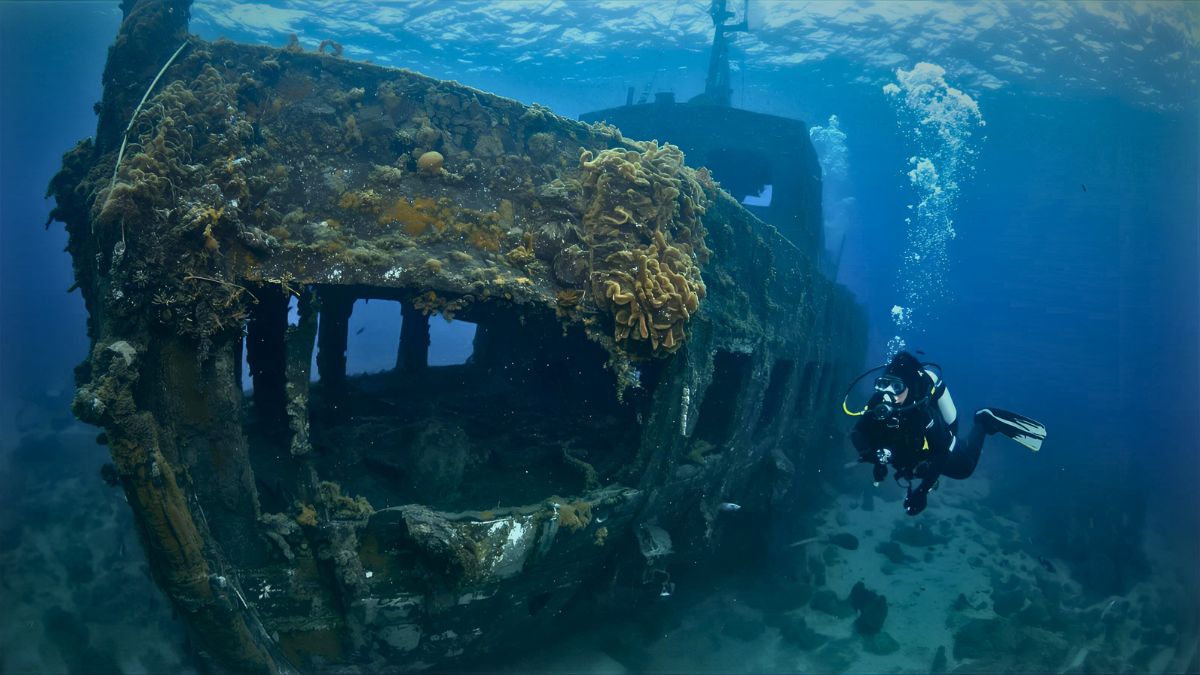As a PADI instructor here in Costa Rica, I answer scuba diving questions every single day. Some come from nervous first-timers standing at the pool edge. Others come from curious travelers who’ve always wondered what it’s like down there. After teaching hundreds of students, I’ve noticed the same questions pop up again and again.
That’s actually a good thing. It means you’re thinking critically about diving before jumping in. Smart decision.
This guide covers the most common scuba diving questions I hear from beginners. These are real concerns from real people, and they deserve honest, straightforward answers. Whether you’re planning your first dive in Costa Rica or just curious about the underwater world, you’ll find what you need here.
Top Scuba Diving Questions About Depth and Safety
How Deep Do You Actually Go When Scuba Diving?
One of the first scuba diving questions I get is about depth. People imagine us exploring the deepest trenches of the ocean, but reality is much less dramatic.
With a PADI Open Water certification, you can dive to 18 meters (60 feet). That’s roughly the height of a six-story building, except you’re going down instead of up. Advanced Open Water extends that limit to 30 meters (100 feet). Complete the PADI Deep Diver specialty, and you can reach 40 meters (130 feet).
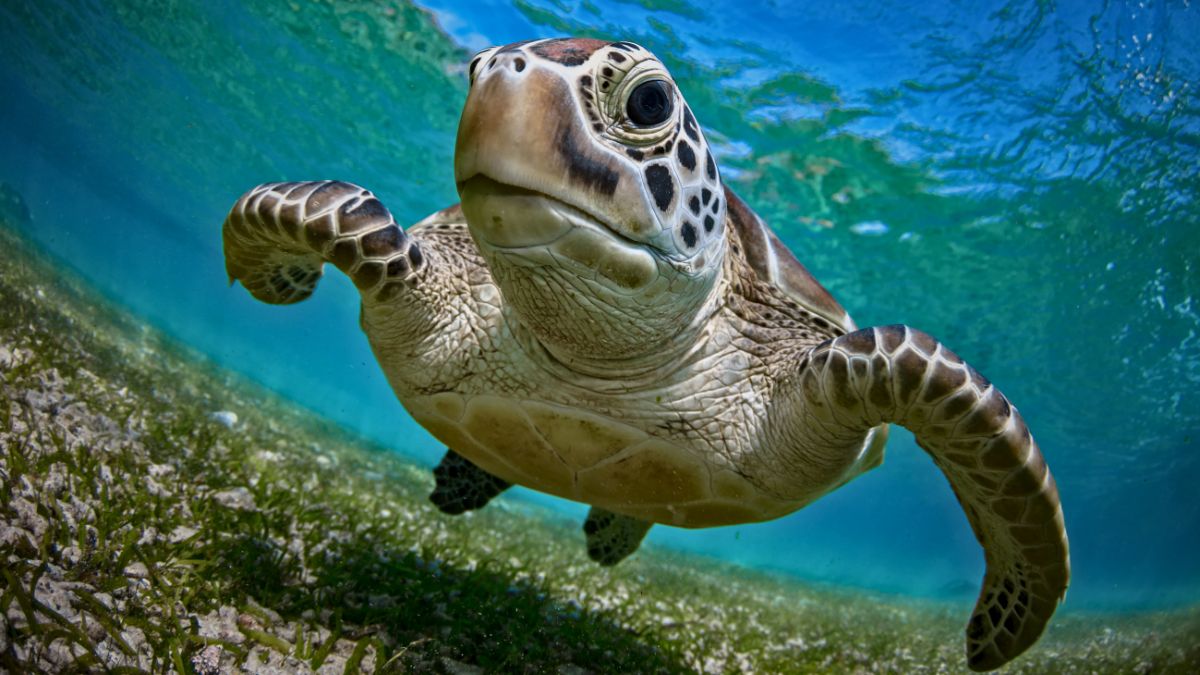
Here’s what surprises most people: the best stuff lives in shallow water.
Most marine life thrives at depths less than 18 meters. Coral reefs need sunlight and grow in shallow zones. Sea turtles cruise at 10-15 meters. Colorful reef fish prefer upper areas where light penetrates best. In Costa Rica, some of our most spectacular dive sites sit at 12-18 meters.
Staying shallow has practical advantages too. Your air lasts much longer. At 10 meters, you might get 50-60 minutes on a single tank. At 30 meters, that drops to 20-25 minutes because you consume air faster under higher pressure.
Did you know? The Titanic wreck sits at 3,800 meters deep. Even the most advanced technical divers have only reached about 332 meters. Recreational diving happens in a completely different depth range, where the ocean is vibrant and alive.
What About Sharks? Are They Really Dangerous?
This is probably the most emotional of all scuba diving questions. I get it. We’ve all seen Jaws.
Let me give you some perspective. In 2018, there were 66 unprovoked shark attacks worldwide. Only about 5% involved divers or snorkelers. That’s roughly 3-4 incidents. Compare that to the 100 million sharks killed by humans each year, and you start to see who should really be afraid.
You’re more likely to be struck by lightning than attacked by a shark. The probability is about 1 in 4 million.
During my years teaching in Costa Rica, I’ve had countless shark encounters. Bull sharks in the Bat Islands, white-tip reef sharks at Catalina Islands, even whale sharks off Cocos Island. Not once has a shark shown aggression toward me or my students. Usually, they’re more interested in swimming away.
Sharks are curious but cautious
Here’s what actually happens: sharks are curious but cautious. They maintain distance. Most species we encounter while diving (reef sharks, nurse sharks, hammerheads) aren’t aggressive toward humans. They’re elegant, beautiful creatures that deserve respect, not fear.
The dangerous ones (great whites, tiger sharks, bull sharks) typically don’t hang out in recreational diving areas. And even these species rarely attack divers. When attacks do occur, they’re usually cases of mistaken identity involving surfers at the surface.
In Costa Rica specifically, you might encounter harmless white-tip and black-tip reef sharks. These guys are basically puppies with fins. They’re so used to divers that they barely notice us. If you want to learn more about the incredible shark species we encounter here, check out our guide on diving with sharks in Costa Rica.
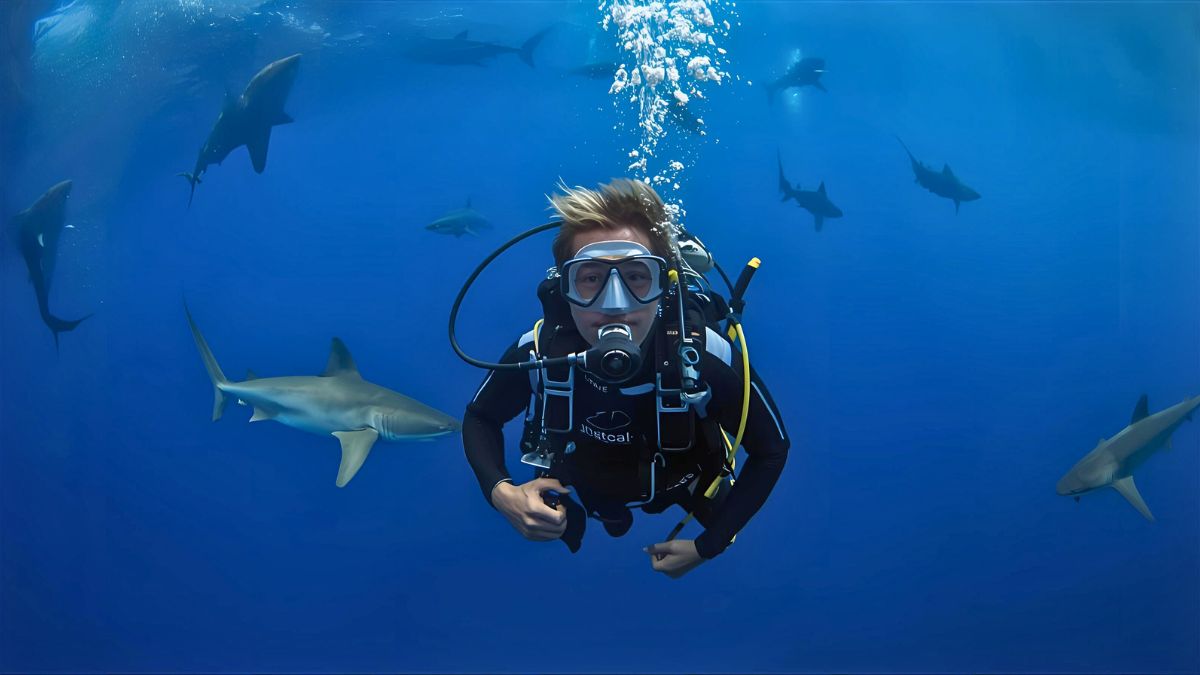
Will My Ears Hurt While Diving?
This is one of the most practical scuba diving questions, coming from real experience. Most people have tried diving down in a pool or while snorkeling and felt that sharp pain around 6-10 feet down.
The good news: that pain is easily preventable once you know the technique.
Pain happens because water pressure increases as you descend, pushing on your eardrums from the outside. The air space in your middle ear stays at surface pressure, creating an uncomfortable squeeze. The solution is equalization.
Equalization means balancing the pressure on both sides of your eardrum. Pinch your nose and gently blow. This opens your Eustachian tubes (passages connecting your throat to your middle ears) and allows air to enter your middle ear. You’ll hear a slight pop or crackling sound, and the pressure disappears.
Try it right now. Pinch your nose, close your mouth, and gently blow. Feel that? That’s equalization.
We teach this skill on day one of every PADI course. Some students get it immediately. Others need a few tries. By the end of confined water sessions, everyone can equalize without thinking about it.
The key is equalizing early and often. Start before you even feel pressure. Equalize every meter or two as you descend. Never try to power through ear pain. If your ears won’t clear, stop your descent, go up a bit, and try again.
One important note: never dive with a cold or congestion. Blocked Eustachian tubes make equalization difficult or impossible, and forcing it can damage your ears.
Common Scuba Diving Questions About Equipment and Air
How Long Does a Scuba Tank Last Underwater?
This scuba diving question usually comes with a misconception. People call it an “oxygen tank,” which drives instructors crazy. We don’t breathe pure oxygen underwater. We breathe regular compressed air, the same stuff you’re breathing right now: about 21% oxygen and 79% nitrogen. If you’re curious about the technical details, our article on scuba tank structure and properties explains how these systems work.
So how long does your air last? The frustrating answer: it depends.
Several factors affect air consumption. Depth is the biggest one. At 10 meters, a standard 12-liter tank might last 50-60 minutes for an average diver. At 30 meters, that same tank provides only 20-25 minutes. This happens because your body consumes air faster under higher pressure.
Your fitness level matters. Anxious, out-of-shape divers breathe faster. Calm, experienced divers breathe slower and make their air last longer. Your breathing pattern, body size, water temperature, and activity level all play roles.
For beginner divers on their first few dives, expect 30-40 minutes on average. As you gain experience and relax underwater, you’ll see that number increase. I’ve had experienced students stretch a tank to 70 minutes on shallow reef dives.
The beauty of PADI training: we teach you to monitor your air constantly. You’ll check your pressure gauge every few minutes. We always end dives with plenty of air remaining. You’ll never come close to running out because we plan conservatively. If you want to understand diving terminology better, check out our diving terminology guide to speak like a diver.
Fun fact: The world record for the longest breath hold is over 24 minutes. But scuba diving isn’t about holding your breath at all. You breathe continuously, which makes it accessible and relaxing compared to freediving.
Why Do Divers Wear So Much Heavy Equipment?
Looking at a fully kitted diver can be intimidating. Tank, vest, weights, wetsuit, mask, fins, regulator. It looks like preparing for a space mission.
Let me break down what each piece does.
The scuba tank holds your compressed air. A full aluminum 80 tank weighs about 14 kg (31 pounds). Heavy on land, nearly neutral underwater.
The BCD (buoyancy control device) is that vest-looking thing. It serves two purposes: holds your tank on your back, and has an inflatable bladder that lets you control buoyancy. Add air to float up, release air to sink down. It’s your underwater elevator.
What other equipment do I need for scuba diving?
Weights seem counterintuitive, right? Here’s the thing: the human body is naturally buoyant, especially in salt water. Add a wetsuit (made of buoyant neoprene foam) and you’d float like a cork. Weights counteract that buoyancy so you can descend and maintain depth control. Most divers wear 2-8 kg depending on body composition and equipment.
The wetsuit keeps you warm. Even in tropical Costa Rica, water temperatures around 24-28°C (75-82°F) can chill you after 45 minutes. The suit traps a thin layer of water against your skin, which your body warms up.
The regulator is your life support system. It reduces high pressure from your tank to breathable pressure automatically as you inhale. Modern regulators are incredibly reliable. If you’re considering buying your own equipment, our dive computer for beginners guide will help you understand what gear to prioritize.
Here’s the magic part: once you enter the water and achieve neutral buoyancy, all that weight disappears. You feel weightless. The tank on your back becomes effortless to carry. It’s like being in space, except surrounded by fish instead of stars.
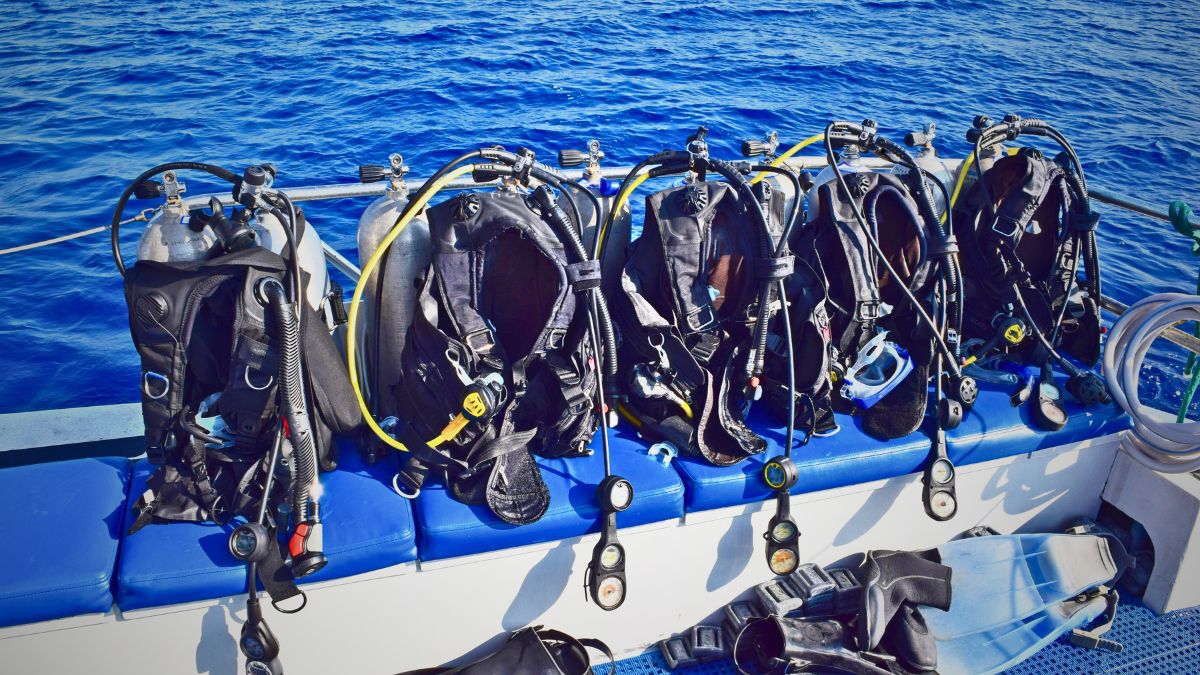
Do You Breathe Oxygen When Scuba Diving?
I’m answering this separately because it’s such a common misconception. No, recreational divers do not breathe pure oxygen!
We breathe compressed atmospheric air: 21% oxygen, 78% nitrogen, traces of other gases. It’s literally the same air you’re breathing as you read this, just compressed into a tank at about 200 bar (3,000 PSI).
Why not pure oxygen?
Because oxygen becomes toxic under pressure. Breathing pure oxygen below about 6 meters can cause seizures and other serious problems. Technical divers use pure oxygen during decompression stops at shallow depths, but that’s specialized training.
Some recreational divers use enriched air nitrox, which contains more oxygen (typically 32% or 36%) and less nitrogen. This allows longer bottom times and shorter surface intervals. But it’s still an air mixture, not pure oxygen.
When you take a PADI course, you’ll learn about gas mixtures, partial pressures, and why we use air. It’s fascinating stuff once you understand the science.
Scuba Diving Questions About Learning and Requirements
Is Scuba Diving Hard to Learn?
Among all the scuba diving questions beginners ask, this one reveals the most anxiety. People worry they won’t be smart enough, coordinated enough, or brave enough.
Here’s the truth: scuba diving is one of the easiest adventure sports to learn.
While underwater, you’re doing three basic things: floating, kicking, and breathing. If you can walk and breathe at the same time, you can learn to dive. The skills aren’t complex. They just require practice and confidence.
PADI’s Open Water course is designed for complete beginners. It breaks down into three sections:
Knowledge development teaches you the theory. Why equalize? What happens to air at depth? How do you plan a safe dive? You can complete this online at your own pace before arriving in Costa Rica. Most students finish in 8-12 hours spread over a few days.
Diving training is very important
Confined water training happens in a pool or calm shallow water. This is where you practice skills in a controlled environment. Clearing your mask, retrieving your regulator, achieving neutral buoyancy, sharing air with a buddy. We practice each skill multiple times until it becomes second nature.
Open water dives are the real thing. Four dives in the ocean, usually over two days. You’ll apply everything you learned in the pool. Your instructor is right there with you, watching, guiding, making sure you’re comfortable.
The entire PADI Open Water course typically takes 3-4 days. Some students finish in 2.5 days. Others prefer spreading it over a week. We move at your pace, not ours. Learn more about our PADI Open Water certification program and what to expect.
Pass rates for PADI courses are very high, around 95%. Students who don’t complete the course usually stop by choice (they realize diving isn’t for them) rather than failing. If you’re motivated and follow instructions, you’ll succeed.
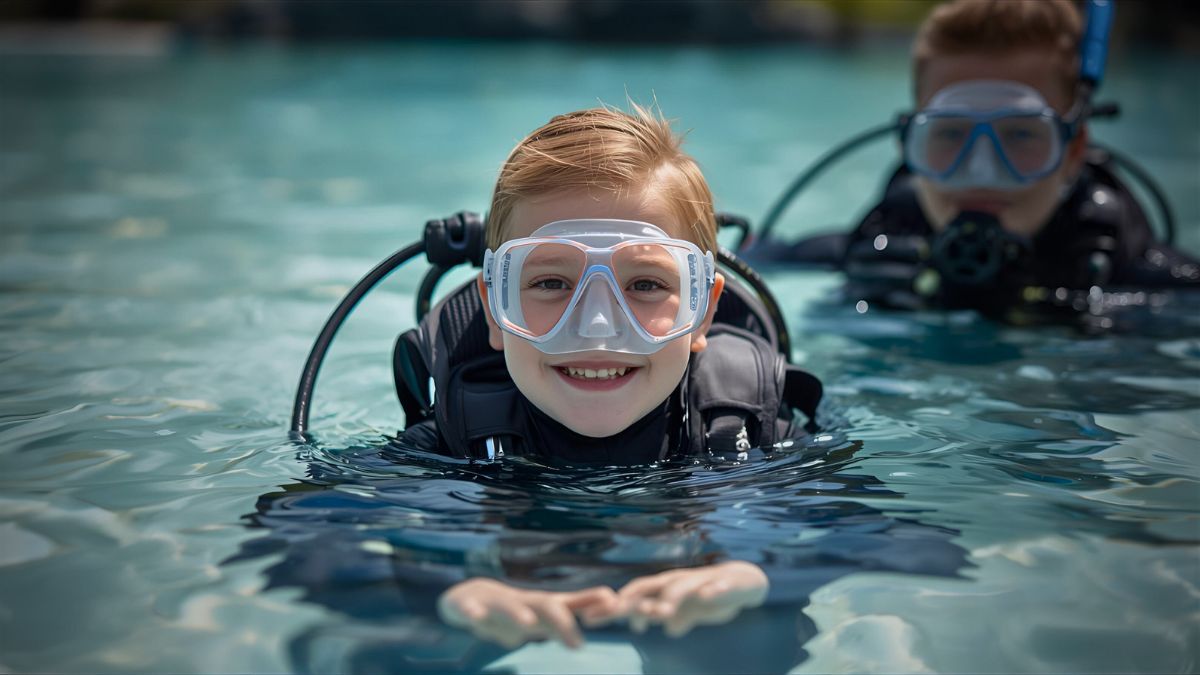
Do I Need to Know How to Swim to Scuba Dive?
This is one of the most important scuba diving questions, and the answer has some nuance.
For PADI Open Water certification, yes, you need basic swimming ability. The requirement is simple: swim 200 meters continuously (any stroke, not timed) or swim 300 meters with mask, fins, and snorkel. You also need to float or tread water for 10 minutes.
These aren’t Olympic swimmer standards. We’re checking that you’re comfortable in water and won’t panic. A slow, casual breaststroke works fine. Taking breaks at the pool edge is okay during practice.
If you’re not quite there yet, don’t give up on diving. The PADI Discover Scuba Diving program requires no swimming test. It’s an introductory experience designed to let you try diving in a pool and shallow ocean environment with an instructor holding your hand the entire time. Many non-swimmers have successfully completed Discover Scuba and loved it.
Scuba diving is for everyone!
Here’s what surprises people: you don’t swim much while scuba diving. Your fins do 95% of the work. You don’t use your arms at all except for minor adjustments. The BCD keeps you at the surface when needed. Diving is actually easier than swimming in many ways.
The swimming requirement exists mainly for surface skills. If your mask falls off at the surface, you need to be comfortable enough to retrieve it without panicking. If you’re separated from the boat, you need to signal and wait calmly. Basic water confidence prevents anxiety.
In Costa Rica, our warm, calm waters are ideal for building that confidence. We’ve taught plenty of weak swimmers who became confident divers. For a deeper dive into this topic, read our article: Do I need to know how to swim to scuba dive?
Am I Too Old (or Too Young) to Start Diving?
Age is one of those scuba diving questions that worries people unnecessarily.
For young divers, PADI offers Junior Open Water certification starting at age 10. Kids ages 10-11 can dive to 12 meters with a certified adult. At age 12-14, they can dive to 18 meters with a certified adult. At age 15, they receive the full Open Water certification with no restrictions.
Younger children (ages 8-9) can participate in Bubblemaker or Seal Team programs. These are fun introductory experiences in pools or very shallow water, not full certifications.
For older divers, there’s no upper age limit. None. I’ve certified students in their 70s and 80s. The oldest diver I personally taught was 74 and became one of my most enthusiastic students. She’s still diving today at 79.
What matters isn’t your age. It’s your health and fitness.
Before starting a PADI course, you’ll complete a medical questionnaire. Certain conditions require a doctor’s clearance: heart problems, lung issues, ear problems, seizure disorders, diabetes. These aren’t automatic disqualifiers. They just mean you need professional medical advice specific to diving. It’s important to work with qualified instructors – learn how to check scuba instructor qualifications before starting your training.
Physical fitness helps, but you don’t need to be an athlete. Diving is low-impact. Many people with limited mobility can dive successfully. We’ve taught students with prosthetic limbs, hearing impairments, and various physical challenges.
The underwater world doesn’t care how old you are. Fish don’t judge. Turtles don’t check your birth certificate. If you’re medically cleared and motivated, you can dive.
Did you know? Ray Woolley from the UK became the oldest scuba diver in the world at age 96. He completed a dive in Cyprus and proved that age is truly just a number when it comes to exploring the underwater world.
Scuba Diving Questions About Cost and Commitment
How Expensive Is Scuba Diving Really?
Money questions are always sensitive, but they’re legitimate scuba diving questions that deserve honest answers.
Let’s break down the costs:
PADI Open Water Certification: $350-500 in most locations. In Costa Rica, expect around $400-450. This includes instruction, pool time, four open water dives, and your certification card. Some shops include equipment rental, others charge separately. For a complete breakdown, see our detailed article on [LINK]how much it costs to be a certified diver.
Equipment rental: If you don’t own gear, renting costs about $40-50 per dive in Costa Rica. This includes everything: BCD, regulator, wetsuit, tank, weights. You’ll want to buy your own mask, snorkel, and fins early ($100-150 total) because fit matters for comfort.
Dive trips: Two-tank boat dives in Costa Rica typically cost $80-120. This includes the boat, guide, tanks, and weights. If you dive 10 times per year at local sites, that’s $800-1,200 annually, plus equipment rental.
Equipment purchase: If you get serious about diving, a full kit (BCD, regulator, wetsuit, computer) runs $1,500-2,500 for quality gear. You don’t need to buy everything immediately. Many divers rent for the first year while deciding what they like.
Let’s compare diving to other adventure sports:
Skiing: Lift tickets ($80-150/day), equipment rental ($40-60/day), lessons ($100-200). A weekend ski trip easily costs $500-700.
Golf: Course fees ($50-200), cart rental ($20-40), club sets ($500-2,000), lessons ($75-150/hour).
Scuba diving fits comfortably in the middle range. It’s not cheap, but it’s not prohibitively expensive either. The certification is a one-time cost. After that, you control your budget based on how often you dive and whether you buy or rent gear.
In Costa Rica, diving offers exceptional value. Our marine biodiversity rivals anywhere in the world. Warm water means you need less thermal protection. Accessible shore diving sites reduce boat costs.
Money-saving tips: Travel in small groups for discounts. Buy used equipment from reputable sources. Dive locally to avoid travel costs. Take specialty courses that interest you genuinely, not just to collect cards.
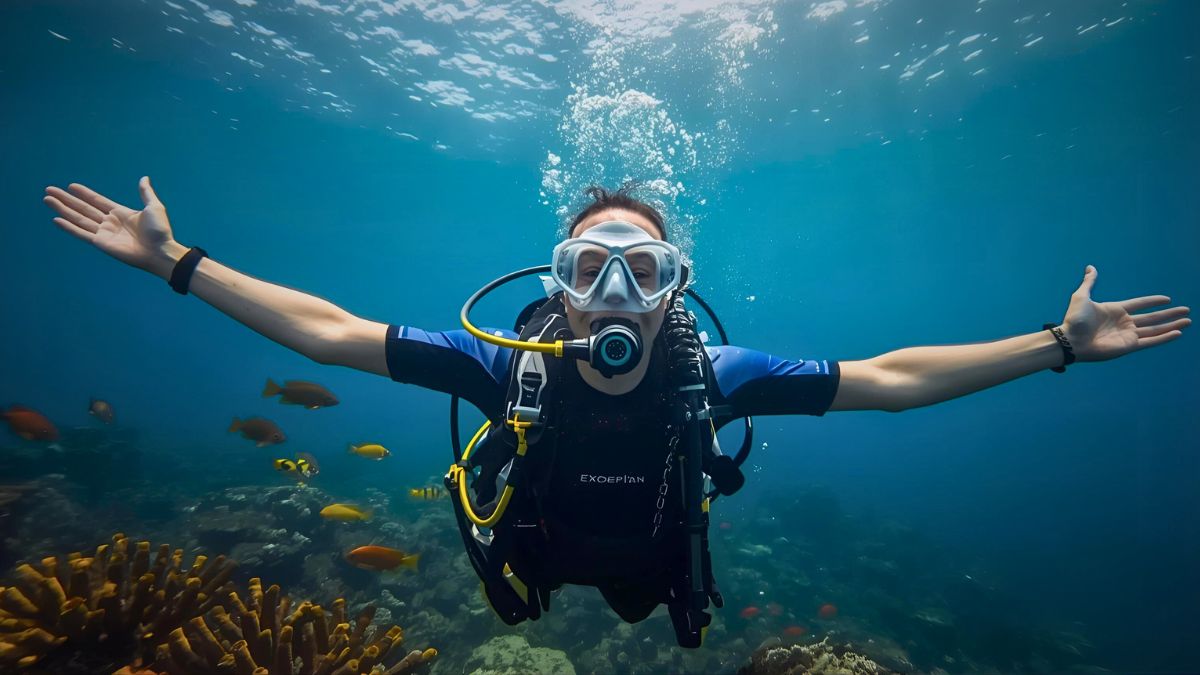
How Often Do I Need to Dive to Stay Certified?
Good news: PADI certifications never expire. Once you’re certified, you’re certified for life. Your card doesn’t have an expiration date.
However, skills do decay without practice.
If you haven’t dived in 6-12 months, expect to feel rusty. Your buoyancy control might be sloppy. Equipment assembly might take longer. You’ll be slower and less confident. This is normal and expected.
Most dive operators ask when you last dived. If it’s been more than 6-12 months, they’ll strongly recommend (or require) a refresher course. PADI offers the ReActivate program specifically for this purpose. It’s a short review of skills and knowledge, usually completed in half a day.
Is this necessary?
Technically no. Your certification is still valid. Practically yes. Refreshers make you safer and more confident. They’re worth the time and small cost.
How often should you dive to maintain skills? Ideally, quarterly (every 3 months) at minimum. Monthly is better. Weekly is ideal if you’re lucky enough to live near good dive sites.
In Costa Rica, we see a mix of local divers who come weekly and tourists who dive once or twice per year during vacation. Both groups enjoy diving. The regulars just have smoother skills and less anxiety.
The beautiful thing about diving: even after years away, muscle memory comes back quickly. A good refresher brings you back to competence in a few hours.
Scuba Diving Questions About the Underwater Experience
What Will I Actually See Down There?
This might be my favorite of all scuba diving questions because the answer is: more than you can imagine.
Over 200,000 species of marine life have been discovered so far, and scientists estimate we’ve only explored about 5% of the ocean. Every dive reveals something different.
In Costa Rica specifically, you’ll encounter incredible biodiversity. Our Pacific coast sits at the convergence of warm tropical currents and cooler nutrient-rich waters. This creates perfect conditions for marine life.
Commonly seen creatures:
- Sea turtles (green, hawksbill, olive ridley)
- Rays (manta rays, eagle rays, stingrays)
- Reef fish (parrotfish, angelfish, butterflyfish, triggerfish)
- Eels (moray eels hiding in crevices)
- Octopus (if you’re observant and lucky)
- Countless colorful reef fish in massive schools
Special encounters:
- Bull sharks at Bat Islands (for advanced divers)
- Whale sharks seasonally off Cocos Island
- Humpback whales passing through during migration
- Giant manta rays gliding gracefully
- Hammerhead shark schools at Cocos Island
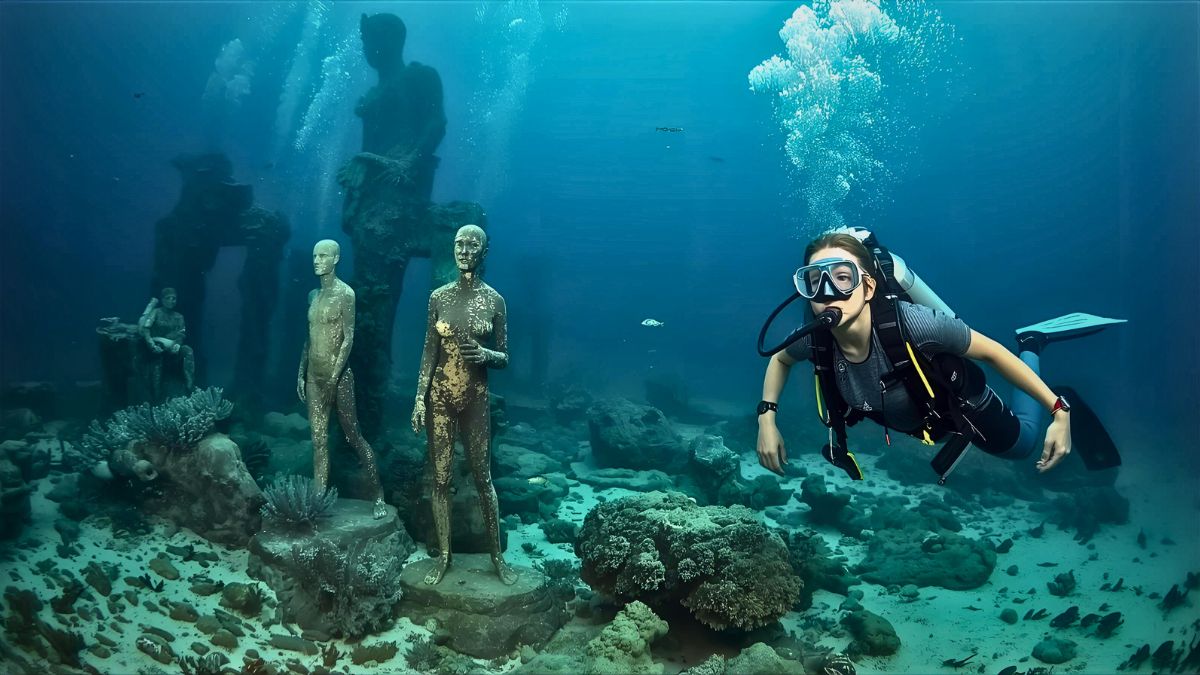
The reef itself:
Coral formations create underwater landscapes more alien than anything on land. Hard corals build intricate structures over centuries. Soft corals sway like underwater gardens. Sponges grow in bizarre tubes and barrels. Everything is colored in ways that don’t exist above water.
What surprises first-time divers most is the sheer abundance. You’re not searching for one special animal. You’re surrounded by life in every direction. Schools of hundreds of fish move as one organism. Tiny cleaners pick parasites off larger fish. Predators hunt. Prey hide. It’s a complete functioning ecosystem, and you’re a privileged observer.
Big underwater creatures
Some divers love the big animals: sharks, rays, turtles. Others obsess over tiny macro life: nudibranchs, seahorses, shrimp. Both are equally fascinating.
Beyond creatures, many divers love exploring underwater geography. Walls dropping into the abyss. Caves and swim-throughs. Volcanic rock formations. In some areas, you’ll find shipwrecks transformed into artificial reefs, covered in marine growth and hosting fish communities. If wreck diving interests you, explore our guide to wreck diving and how to start.
The underwater world is vast, varied, and endlessly interesting. Every dive is different, even at the same site. Conditions change. Animals migrate. You notice details you missed before.
Can You Talk Underwater While Scuba Diving?
Short answer: no, but you don’t need to.
Your regulator occupies your mouth. Speaking is impossible. Trying to talk just floods your regulator and makes you cough.
Instead, divers use a system of hand signals. These are standardized gestures that work across languages and cultures. You’ll learn them during your PADI course.
Essential signals:
- Okay: Circle with thumb and index finger
- Problem: Hand waggling palm down
- Going up: Thumb up
- Going down: Thumb down
- Out of air: Slashing motion across throat
- Share air: Hand on chest, moving back and forth
- Look at this: Pointing gesture
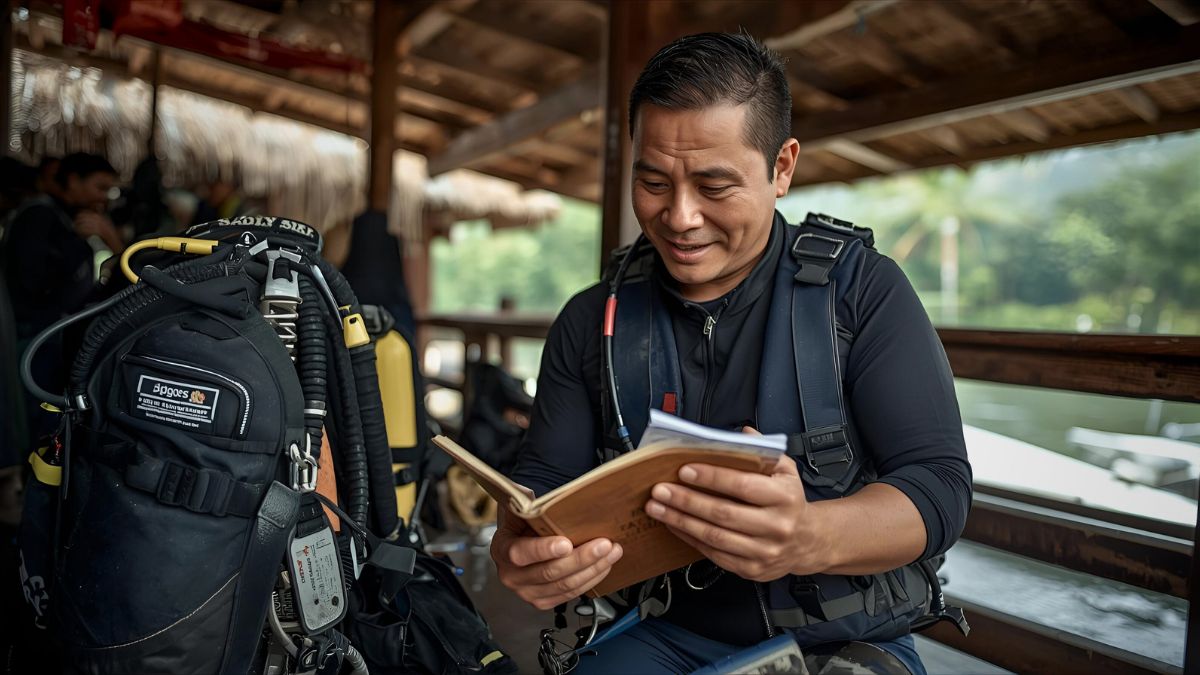
Beyond basics, divers develop their own creative signals. Point at your eyes, then point at something: look there. Make fish-swimming motion: I see a fish. Shrug shoulders: I don’t know.
Honestly, you don’t need much conversation underwater. Most communication involves confirming you’re okay, directing attention to interesting sights, or signaling the plan. It’s surprisingly effective.
How can you communicate underwater?
For longer messages, divers carry slate boards (small waterproof writing surfaces). You can write quick notes with attached pencils. We use these for teaching complex concepts during training dives.
The silence is actually one of diving’s great pleasures. No talking means total immersion in the environment. You hear your own breathing, water currents, and marine life. It’s meditative. Many divers find the quiet underwater world deeply relaxing, a break from constant conversation and screens.
Some technical and commercial divers use communication systems (full-face masks with radios), but recreational divers rarely need them. Hand signals work beautifully.
More Scuba Diving Questions Beginners Ask
Let me rapid-fire answer a few more quick scuba diving questions:
Can you touch the fish and coral?
No, and here’s why. Many marine creatures have protective mucus coatings that your touch removes, making them vulnerable to infection. Coral is a living animal that dies easily from contact. Fire coral and some sponges can sting you. Beyond health concerns, touching disturbs animals and damages fragile ecosystems. The diving mantra: look but don’t touch. Take only photos, leave only bubbles.
What happens if you run out of air?
This virtually never happens with proper training, but we prepare you anyway. Every certified diver has a buddy within arm’s reach. If your air runs low, you signal your buddy, and they share their alternate air source (every diver carries two regulators). You breathe from their tank while ascending together safely. We practice this skill repeatedly during training until it becomes automatic. Additionally, you’ll learn to monitor your air gauge constantly and end dives with plenty remaining.
Can you dive if you wear glasses?
Absolutely. You have two options. First, many divers wear daily disposable contact lenses. If you lose one during mask-clearing skills (which happens occasionally), you simply continue with one eye. Second, you can buy a prescription dive mask. Some dive shops stock them, or you can order a custom mask with your exact prescription. If you’re only slightly farsighted, adhesive magnifying lenses stick inside a regular mask. Your vision underwater doesn’t need to be perfect, but being able to see enhances the experience significantly.
Is scuba diving claustrophobic?
Most people don’t find it claustrophobic at all. You’re in open water with 360-degree visibility, not confined in a tight space. Some anxious divers initially feel confined by the equipment or mask, but this passes within minutes once you relax underwater. The sensation is actually the opposite of claustrophobia: you’re floating in vast open space. If you genuinely suffer from severe claustrophobia, mention it to your instructor. We have techniques to ease anxiety gradually. Many previously claustrophobic students discover diving is surprisingly freeing.
Fun fact: The Great Barrier Reef in Australia is so large it can be seen from space. It spans over 2,300 kilometers and contains over 400 types of coral, 1,500 species of fish, and 4,000 types of mollusc. Yet even smaller reef systems like those in Costa Rica host thousands of species in concentrated areas.
Stop Asking Scuba Diving Questions and Start Diving in Costa Rica!
I hope these answers have addressed your scuba diving questions and given you a clearer picture of what diving involves. The truth is, reading about diving only gets you so far. The real magic happens when you take that first breath underwater.
Most scuba diving questions come from natural curiosity mixed with reasonable caution. That’s healthy. Diving is an adventure sport that requires training and respect for the environment. But it’s also accessible, safe, and transformative when you learn properly.
Costa Rica offers some of the world’s best conditions for learning to dive. Our warm Pacific waters (24-28°C year-round) mean comfortable diving without thick wetsuits. Our incredible marine biodiversity guarantees you’ll see amazing creatures on every dive. Our calm, protected bays provide perfect training conditions. And our experienced PADI instructors have answered every scuba diving question imaginable.
Start your underwater adventure!
Whether you’re ready to commit to full [LINK]Open Water certification or just want to try diving with [LINK]Discover Scuba Diving, we’re here to guide you. We’ll answer every question, address every concern, and make sure you feel confident and prepared.
The underwater world is waiting. It’s more beautiful, more surprising, and more accessible than most people realize. All those scuba diving questions you’ve been asking? They’re the first step toward an adventure that could change your life.
Ready to experience it yourself? Contact Costa Rica Divers today to book your PADI Discover Scuba Diving session or start your Open Water certification. Our instructors are standing by to answer your questions in person and welcome you to our diving family.
Still have questions? Drop them in the comments below or reach out directly. There’s no such thing as a silly scuba diving question. We’ve heard them all, and we’re happy to help.
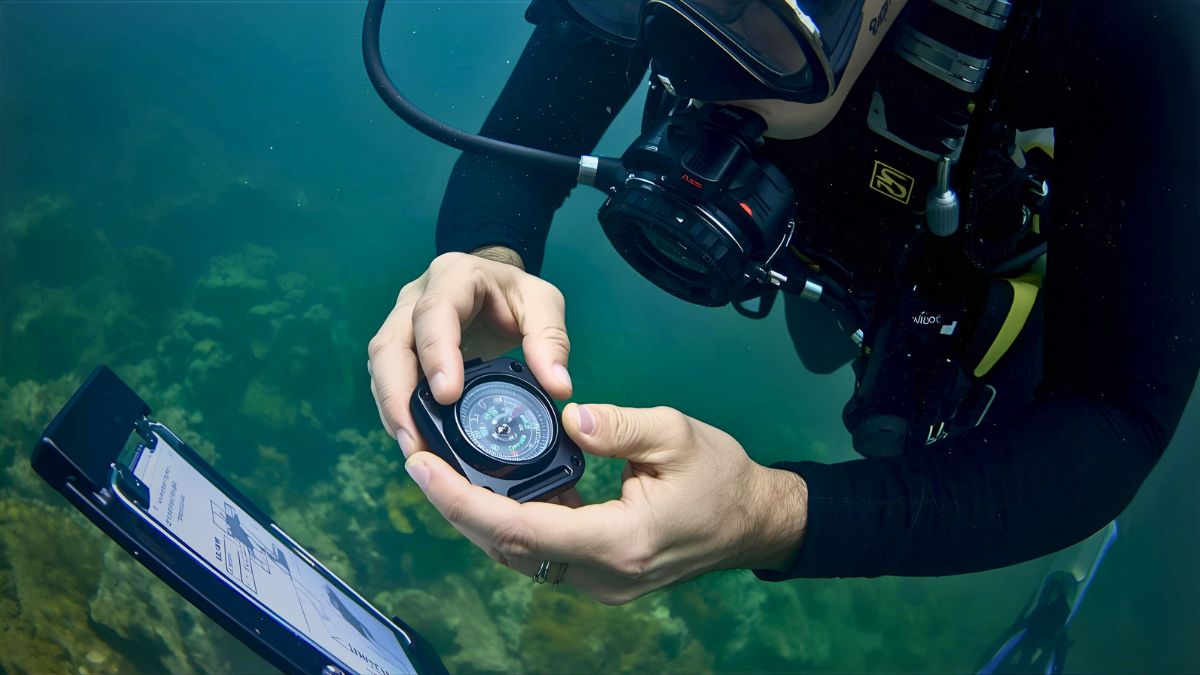
Frequently Asked Scuba Diving Questions
How deep can you dive with Open Water certification?
PADI Open Water divers can dive to 18 meters (60 feet). Advanced Open Water extends this to 30 meters (100 feet), and the Deep Diver specialty allows 40 meters (130 feet).
Do you breathe oxygen when scuba diving?
No, recreational divers breathe regular compressed air (21% oxygen, 79% nitrogen), the same air you’re breathing right now.
How long does a scuba tank last?
It depends on depth and breathing rate, but typically 30-60 minutes for recreational dives. Shallow dives allow longer bottom time.
Can non-swimmers learn to scuba dive?
For full certification, basic swimming ability is required (200m swim). However, the Discover Scuba Diving program has no swimming requirement.
How much does scuba certification cost?
PADI Open Water certification typically costs $350-500. In Costa Rica, expect around $400-450 including instruction, materials, and four open water dives.
Are sharks dangerous to scuba divers?
No. Shark attacks on divers are extremely rare (about 3-4 incidents worldwide per year). You’re more likely to be struck by lightning than attacked by a shark while diving.
Do scuba certifications expire?
No. PADI certifications are valid for life and never expire, though refresher courses are recommended if you haven’t dived in over a year.
Sources used in writing this blog
- PADI – Official training standards and safety statistics
- International Shark Attack File, Florida Museum of Natural History – Shark attack statistics
- DAN (Divers Alert Network) – Diving safety research and medical information

